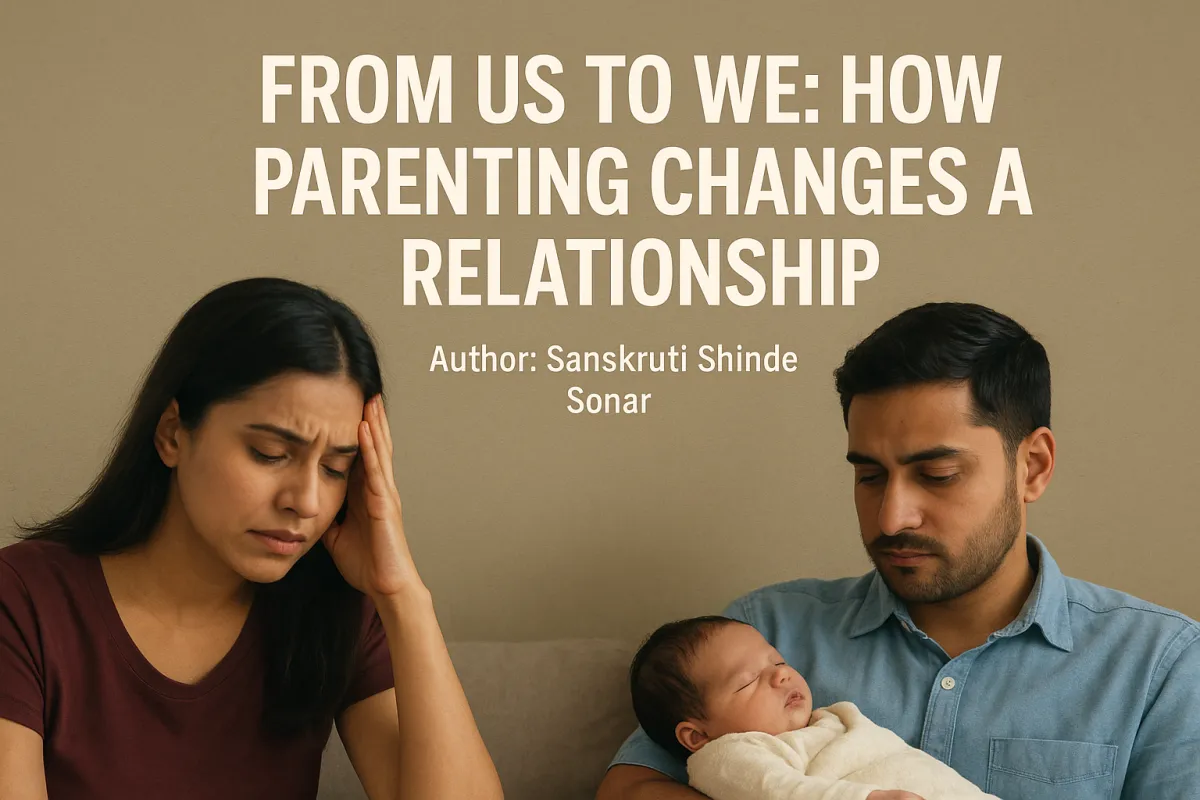
“Are We Losing Us?” How Parenting Changes a Relationship
When Trishna first held baby Ruve in her arms, she felt love in a way she didn’t know was possible. The tiny fingers, the soft breaths, the warmth—it was everything she had dreamed of. But alongside the love came waves of exhaustion, guilt, and something she was almost afraid to admit: loneliness.
She glanced at Nirav, who was smiling proudly as he clicked yet another picture of their newborn. For a moment, she wondered if he felt the same mix of emotions—or if parenthood had created a quiet gap between them.
Parenthood had changed their rhythm. Their days revolved around feeding, diaper changes, and trying to steal short naps whenever Ruve slept. Conversations had become transactional:
“Did you sterilize the bottles?”
“Whose turn is it to wake up?”
“Did you call the pediatrician?”
The long, lazy Sunday breakfasts and late-night drives that once defined their bond were now distant memories. Nirav often came home from work, went straight to Ruve’s crib, and collapsed into bed after. Trishna felt invisible, as if her role had been reduced to caretaker, not partner.
Sometimes she resented Nirav for getting a “break” at work. Other times she envied how effortlessly he seemed to bond with the baby while she struggled with her postpartum body and emotions. But mostly, she felt a deep ache for the closeness they once shared.
“Are We Losing Us?”
One night, after another exhausting day, Trishna whispered, “Do you ever feel like we’re drifting apart?”
Nirav hesitated. “We’re just tired, Trish. It’ll get better.”
But to her, it wasn’t that simple. It wasn’t just about sleepless nights. It was about feeling unseen, unheard, and unsure if their marriage could survive this transition.
Weeks later, sitting in my office with tears she had been holding back, Trishna asked me something I’ve heard from countless new parents:
“How can we keep our relationship strong after having a baby?”
It’s a question layered with fear, guilt, and longing. Fear that the spark is fading. Guilt for even thinking about themselves when there’s a baby who needs them. Longing for the partnership they once had.
What Trishna Was Really Struggling With
When we unpacked her emotions, a few recurring themes emerged, things many parents experience but rarely talk about openly:
Unequal responsibilities: She felt like she was carrying the bulk of the caregiving, while Nirav got to “step in and out.”
Emotional distance: Conversations had shrunk to baby logistics. She missed being seen as Trishna, not just “Ruve’s mother.”
Loss of intimacy: Between hormonal shifts, exhaustion, and self-consciousness, closeness felt like a faraway luxury.
Identity shift: She wasn’t sure who she was anymore, mother, wife, individual? Where did she fit in?
Silent resentment: She loved Nirav, but underneath, she was keeping score, who did more, who sacrificed more.
These struggles don’t make her a bad wife or mother. They make her human. In fact, studies show that almost two-thirds of couples experience a dip in relationship satisfaction after their first child. But because no one warns you, the guilt and confusion can feel overwhelming.
When Trishna asked her question, I didn’t hand her a quick-fix list of solutions. Because the truth is, parenthood is not a puzzle you solve once and for all. It’s a constant reshaping of roles, expectations, and connection.
What therapy offers is a safe space to slow down and actually talk, not about bottles, diapers, or chores, but about fears, loneliness, unmet needs, and unspoken resentments.
For couples like Trishna and Nirav, therapy often becomes the first time they:
Say out loud what they’ve been holding back.
Hear each other without rushing to defend.
Discover patterns that keep them stuck.
The tools and interventions come later. First, it’s about creating a space where both feel heard and validated.
After a few sessions, something shifted. It wasn’t dramatic, there wasn’t a single moment where everything was “fixed.” But slowly, Trishna felt less alone in her struggles. Nirav began to understand the invisible load she was carrying. They began speaking to each other with less defensiveness and more curiosity.
Trishna once told me, “It feels like we’re learning how to be a team again, but in a completely new game.”
And that’s exactly what parenthood does: it changes the game. But it doesn’t mean you lose. It means you learn new ways to play "together".
A Gentle Reminder to New Parents
If you’ve ever looked at your partner and wondered if you’re drifting apart since the baby arrived, you’re not alone. The questions you’re scared to ask are the same ones many couples carry silently.
And sometimes, the bravest step is simply to say them out loud.
Therapy doesn’t erase the messiness of parenthood. But it can help you find each other again within it.
